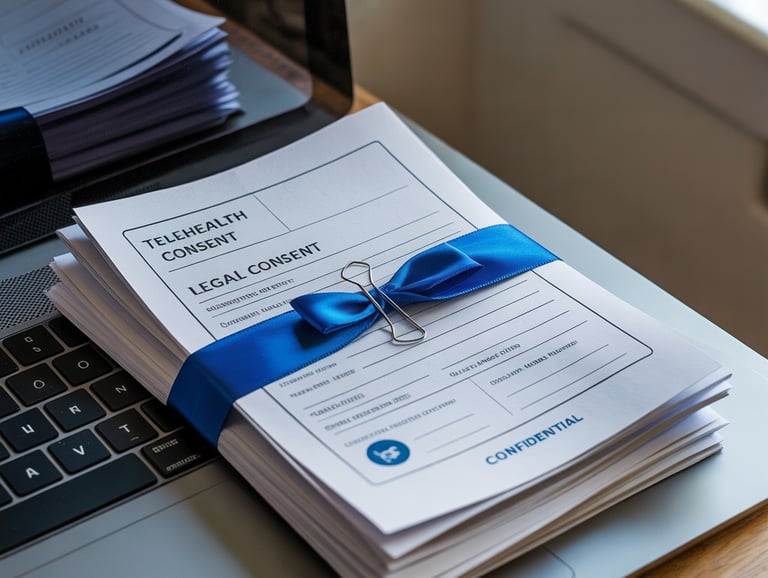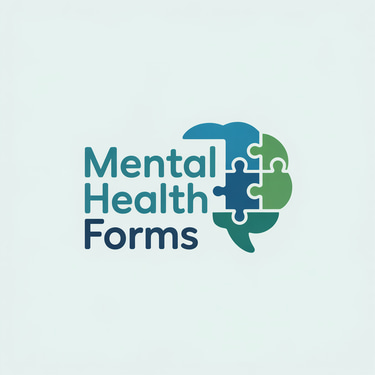Why Updated Mental Health Forms Can Save Your Practice From Liability
Explore why keeping mental health consent forms, telehealth agreements, and compliance documentation up to date is essential to protect your practice from legal risk. This article explains how outdated or generic forms can leave providers vulnerable and why every clinician should consider using professionally developed, 2025-ready templates to ensure client safety, meet regulatory requirements, and maintain a high standard of care.
1/8/20256 min read


Many mental health professionals treat documentation as routine administrative work—a necessary hassle, something to be filled out and filed away. But in reality, forms like consent agreements, telehealth disclosures, HIPAA acknowledgments, and release authorizations are critical legal tools that can determine whether a practice survives a complaint, an audit, or even a lawsuit.
Outdated or generic forms might seem harmless, but they can expose clinicians to enormous liability. When standards change or regulations tighten, what was “good enough” a few years ago might fail to hold up under scrutiny today. For practices aiming to provide ethical, professional care while safeguarding their reputation and finances, ensuring forms are current and legally sound isn’t optional. It’s essential.
Forms Aren’t Just Paperwork—They’re Protection
Documentation is one of the primary ways mental health providers protect themselves, their clients, and their businesses. When properly drafted and consistently used, forms serve as clear evidence that clients were informed about treatment, understood the limits of confidentiality, accepted telehealth risks, and agreed to payment and cancellation policies.
If ever challenged—by a licensing board, an insurance auditor, or a client’s attorney—these forms are a clinician’s first line of defense. They provide written proof of compliance with ethical guidelines, legal requirements, and professional standards.
But outdated, incomplete, or poorly written forms often fail in this critical role. They may lack required disclosures, contain outdated privacy language, or be too vague to demonstrate informed consent. When that happens, providers are left exposed.
The Hidden Liability of Outdated Forms
One of the greatest risks for any mental health practice is believing that once forms are in place, the work is done. Regulations change. Best practices evolve. Clinical realities shift.
Consider these common issues found in older or generic forms:
Consent forms missing legally required disclosures about confidentiality limits or client rights.
Telehealth forms that ignore technology risks or fail to address location-specific requirements.
HIPAA acknowledgments with outdated or incomplete privacy language.
Release of information forms that don’t meet state or federal standards.
Practice policies that fail to address payment, cancellations, or remote session procedures.
Relying on such forms can lead to serious consequences. Even well-intentioned clinicians can face complaints, audits, denied claims, or even legal action if their documentation doesn’t meet current requirements.
The Changing Landscape of Telehealth
Telehealth is no longer a temporary measure. It’s a permanent part of mental health care. That shift has brought new challenges and regulatory expectations.
Generic therapy consent forms often fail to cover critical telehealth considerations, such as:
Disclosure of technology risks, including potential privacy breaches.
Agreements about client location during sessions, which can affect licensure and legal jurisdiction.
Emergency planning and response procedures when working remotely.
Clear acknowledgment of the limitations of remote care.
HIPAA-compliant language addressing data security for electronic communications.
Practices that adopted quick, improvised telehealth forms during the early days of the pandemic may now find those documents woefully inadequate. Regulators, insurers, and clients increasingly expect clear, detailed, and compliant telehealth consent documentation.
HIPAA Compliance Is Non-Negotiable
HIPAA violations are among the most costly risks for mental health providers. Penalties can reach tens of thousands of dollars, and even minor mistakes can trigger investigations and mandatory corrective actions.
A common source of HIPAA non-compliance? Outdated or incomplete forms.
Older consent and privacy acknowledgment forms often lack the required language that satisfies today’s expectations for informed consent and notice of privacy practices. They may omit explanations of client rights, fail to clarify how data will be used and stored, or lack explicit authorization for electronic communications.
Regulators do not accept ignorance or good intentions as a defense. Providers are expected to stay current and proactive in maintaining compliant documentation.
Audits Are Becoming Routine
More insurance companies, Medicaid programs, and licensing boards are conducting audits to ensure providers meet documentation standards. These reviews often begin with one simple request:
“Provide your signed forms.”
If a practice can’t produce clear, legally sound, fully executed documents for every client, the consequences can be severe. Auditors may deny claims, demand repayments, impose sanctions, or refer the matter for further investigation.
Practices that treat forms as a mere formality rather than an essential legal record risk significant financial loss and reputational damage.
Legal Disputes Happen to Good Clinicians
Many therapists assume, “It won’t happen to me.” But even the most ethical, competent professionals can face disputes or complaints.
Clients may misunderstand the limits of confidentiality. Families in custody battles may weaponize records. A miscommunication or clinical disagreement can escalate into formal complaints or lawsuits.
In these moments, a practice’s documentation becomes its defense. Without clear, signed, legally sound forms, it becomes difficult—if not impossible—to demonstrate that clients were properly informed and that ethical and legal standards were followed.
Forms Are Contracts
One critical point often overlooked: consent forms, telehealth agreements, and practice policies are contracts.
A contract must be clear, complete, and defensible. Vague, outdated, or inconsistent forms are weak contracts. They’re easy to challenge in court, difficult to defend to regulators, and prone to being dismissed or invalidated.
Maintaining strong, current forms isn’t about bureaucracy. It’s about protecting the practice and ensuring that any agreement with a client is clear, enforceable, and professionally responsible.
Why Updating Forms Is an Investment, Not an Expense
Some practices see updating forms as an annoying cost. But failing to update them is what’s truly expensive.
Consider the costs of ignoring this need:
Hiring attorneys to defend against a complaint or lawsuit.
Paying back thousands in insurance claims after a failed audit.
Losing clients who don’t trust unclear or outdated paperwork.
Facing licensing board sanctions or mandatory corrective plans.
By contrast, investing in well-crafted, updated forms is a proactive strategy. It’s about building a solid foundation that reduces legal risk, protects income, and supports client relationships.
What It Means to Be Updated for 2025
Regulatory expectations and clinical best practices change over time. Mental health documentation that was acceptable five years ago might now be inadequate.
Updated forms for 2025 need to address current realities, such as:
Evolving state and federal privacy laws.
Increased telehealth adoption and associated risks.
More stringent insurance audit standards.
New expectations for informed consent clarity and completeness.
Using 2025-ready forms means meeting today’s requirements—not relying on old templates that no longer satisfy legal or professional standards.
The Role of Professional Templates
Generic templates found online or shared informally between colleagues often fall short. They may be too broad, lack state-specific language, or fail to reflect modern best practices.
Professionally developed templates, by contrast, are designed with real-world compliance in mind. They include:
Detailed, clear language suitable for mental health practice.
Sections addressing informed consent, confidentiality, payment, and telehealth disclosures.
HIPAA-compliant privacy acknowledgments.
Easy customization for specific practice needs.
Audit-friendly formatting and content.
They’re not just forms—they’re risk management tools.
How Modern Documentation Supports Client Care
Updated forms don’t just protect the practice—they also improve the client experience.
Clear, comprehensive forms help clients understand their rights and responsibilities. They reduce confusion and misunderstandings. They foster trust by demonstrating professionalism and transparency.
Clients are more likely to respect boundaries, adhere to payment policies, and appreciate confidentiality limitations when these are clearly explained upfront.
Good documentation is a hallmark of ethical practice, supporting both clinician and client safety.
Don’t Wait for a Complaint or Audit
Too many providers only realize their documentation is deficient after it’s too late.
By the time a complaint is filed or an audit notice arrives, the opportunity to fix inadequate forms is gone.
The time to update forms is before they’re needed as evidence.
Proactive providers review and refresh their documentation regularly, ensuring they meet current standards and stand up to scrutiny if ever challenged.
Why Choose MentalHealthForms.com
For practices seeking an efficient, reliable solution, MentalHealthForms.com offers a comprehensive library of professionally developed, 2025-ready mental health forms.
These templates are designed specifically for mental health professionals and include:
Consent forms with clear, legally sound language.
Telehealth agreements addressing technology risks and HIPAA requirements.
HIPAA acknowledgments reflecting current privacy laws.
Release of information forms meeting state and federal standards.
Practice policy documents covering payment, cancellations, and boundaries.
All templates are easy to customize, downloadable instantly, and developed with compliance in mind.
By choosing professional, updated forms, practices can reduce liability, improve client trust, and focus on delivering excellent care.
Protect Your Practice Today
Documentation isn’t just paperwork. It’s protection.
Outdated, generic, or incomplete forms put mental health practices at unnecessary risk. Updated, well-designed forms are an investment in professionalism, compliance, and peace of mind.
For clinicians who want to safeguard their work, reduce liability, and support their clients with clear, ethical agreements, there’s no better time to act.
Explore the full library of 2025-ready mental health forms at MentalHealthForms.com and make sure your practice is protected for the future.
Forms
Streamlined templates for mental health documentation needs.
© 2023. All rights reserved.
